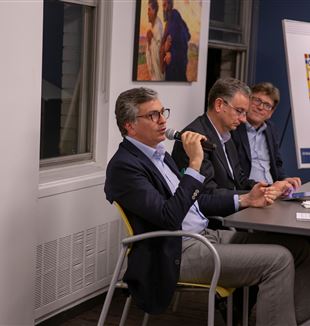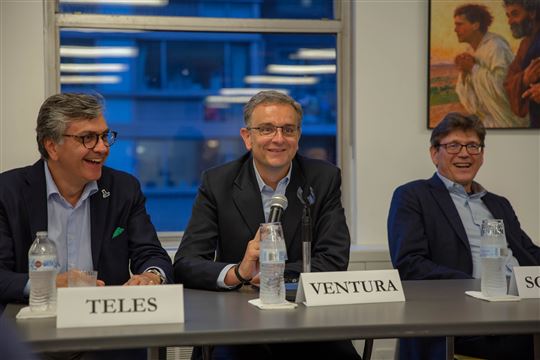
Unity of Life, Not Balance
On May 31, a crowd of about seventy gathered to listen to a panel discussion with Jostein Solheim and Nuno Teles. The theme of the event was life, purpose, and the workplace.“I can’t believe they’re still asking questions!” commented Jostein Solheim, Executive Vice President for Food and Refreshment at Unilever North America and one of the evening’s speakers. It was near the end of an intense conversation about “life, purpose, and the workplace,” sponsored by Crossroads Cultural Center. That so many people would show up on a Friday night after a long week of work to spend more time discussing work astonished Solheim. It was 9:00 pm and the small crowd of nearly seventy people that had gathered in downtown Manhattan would have continued the dialogue with him and Nuno Teles, President of Diageo Beer Company, if Alessandro Ventura, the moderator of the event, hadn’t called it a night after an hour and a half of conversation, stories, and questions.
Ventura, the CIO of Unilever North America, is a good friend of many in attendance that evening. However, the draw of his friendship couldn’t account for the “standing room only” audience which included all sorts of folk, men and women, American born and immigrants, newly graduated high school students, millennials, people facing retirement, teachers and doctors, musicians and tech workers. Clearly the topic of discussion touched a nerve, kindling some kind of hope that we might figure out the meaning of this thing that we spend our life doing.
Ventura began the discussion by putting the centrality of work front and center, “Work is indeed the activity that takes most of our time during the day and during our life span and no matter what job we do ... we want to leave a mark in the world and we want to do something great, something for which we can be remembered.” Focussing the discussion on the passion that fuels the work life of these two men, Ventura asked them to excavate its roots. Two key elements came to the fore: the importance of discovering one’s purpose and need to embrace risk. Solheim said, “Be ready to be fired everyday - that gives you the freedom to work.” He believes that fear of failure is the biggest barrier to individual fulfillment and success. Through stories of risks he has taken throughout his career, Teles illustrated how embracing risks helped him find his purpose. In fact he has come to the realization that his purpose at work is to be a risk taker, likening himself to a sort of Jesse James who blazes forward where others might not dare to go, allowing people to follow his lead. Of course, where there is risk there is also failure. Solheim believes companies should embrace failure so that workers may learn from risk without fear, citing Ben and Jerry’s “flavor graveyard” as an example of how a successful company allows for failure. The flavor graveyard is the list of innovative ice cream flavors that were tried and failed. He says if you work at Ben and Jerry’s you should expect to have some flavors in the graveyard, otherwise you aren’t taking the creative risks that will lead to success. 
Risk alone isn’t enough to sustain passion for work. According to Teles, it was encounters with people he met serendipitously throughout his career that made work an experience of moving from one adventure to the next. “There is always that encounter. Things happen for a reason and they are the consequence of having an encounter with someone. And so I ask myself, am I doing the same? Am I identifying the individuals around me who are talented?”
The anecdotes shared by Solheim and Teles held the audience’s attention, but the questions posed during the Q and A portion of the discussion were no less engaging. How does one deal with the consequences of risk? Is it possible to encourage risk in an anxiety ridden environment? How can you live work in a way that doesn’t suck the life out of life? How do you encourage the average person who is not “top talent” to live work with purpose? The answers offered by the speakers were not exhaustive, but they came from a place of experience, offering a perspective that hinted at a path.
While the evening’s speakers enthralled the audience, no less fascinating was the palpable energy radiating from the small crowd in attendance who, discovering they shared a common question, were invigorated by seeking the answer together. As Ventura said at the beginning of the event, “What we want in life and in work is unity, not balance.” Perhaps this is the answer to Solheim’s astonishment at finding so many people wanting to talk about work on a Friday night, instead of heading down the street to the local bar trying to forget all about it.